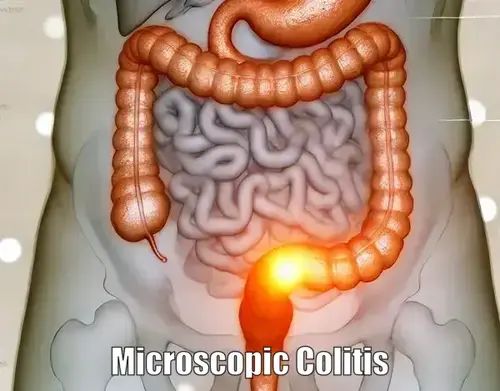Meet Laura, a 42-year-old woman who has been struggling with chronic diarrhea for months. Despite changing her diet and avoiding common triggers, nothing seems to help. After several tests, she was diagnosed with microscopic colitis, a lesser-known inflammatory bowel disease that affects the colon. Like many others, Laura is now on a journey to understand how to manage and possibly eliminate her symptoms.
Microscopic colitis is a condition that causes inflammation of the colon, leading to persistent diarrhea, abdominal pain, and fatigue. While it may not be as well-known as Crohn’s disease or ulcerative colitis, it can significantly impact a person’s quality of life. The good news is that with the right treatment plan and lifestyle adjustments, it’s possible to manage and reduce the symptoms.
Symptom Breakdown: Recognizing Microscopic Colitis
Before diving into how to get rid of microscopic colitis, it’s important to understand the common signs of the condition. If you experience the following symptoms, it’s crucial to seek medical advice:
- Chronic diarrhea: Watery diarrhea that lasts for weeks or even months is the hallmark symptom of microscopic colitis.
- Abdominal pain and cramping: Persistent discomfort in the lower abdomen, often triggered by bowel movements.
- Fatigue: Dehydration and malnutrition due to diarrhea can lead to feelings of extreme tiredness.
- Unexplained weight loss: Sudden weight loss may occur as a result of malabsorption.
While these symptoms are common, they can often be confused with other digestive disorders, which makes accurate diagnosis essential.
Diagnostic Path: How Is Microscopic Colitis Diagnosed?
If you’re experiencing persistent diarrhea and related symptoms, your doctor may order several tests to confirm the diagnosis of microscopic colitis. Here’s a breakdown of the diagnostic process:
| Test | Purpose |
|---|---|
| Colonoscopy with Biopsy | Examines the colon and removes tissue samples. |
| Stool Tests | Rules out infections or parasites. |
| Blood Tests | Checks for signs of inflammation and malnutrition. |
| CT or MRI Scans | Looks for other structural issues in the abdomen. |
A biopsy taken during a colonoscopy is essential to confirm the diagnosis since microscopic colitis cannot be seen by the naked eye.
Deep Dive: What Causes Microscopic Colitis?
Microscopic colitis is not fully understood, but several factors can contribute to its development. Common triggers include:
- Medications: Certain drugs, especially NSAIDs and proton pump inhibitors (PPIs), have been linked to microscopic colitis.
- Autoimmune disorders: People with autoimmune diseases, such as celiac disease or rheumatoid arthritis, are more prone to microscopic colitis.
- Bacterial infections: Gut infections can disrupt the balance of the intestinal flora, triggering inflammation.
- Genetics: A family history of inflammatory bowel disease (IBD) may increase your risk of developing microscopic colitis.
Understanding what may have triggered your condition is the first step in finding the most effective treatment.
Treatment Comparison: How to Treat and Manage Microscopic Colitis
Once diagnosed, there are several treatment strategies that can help manage microscopic colitis and bring relief from symptoms.
- Dietary Adjustments
Diet plays a crucial role in managing microscopic colitis. Here’s a helpful table outlining which foods to avoid and what to include in your diet:
| Foods to Avoid | Foods to Include |
|---|---|
| Fatty or fried foods | Lean proteins (chicken, fish) |
| Dairy products (if lactose-intolerant) | Gluten-free grains (rice, quinoa) |
| Spicy foods | Cooked vegetables |
| Caffeinated drinks | Hydrating fluids (water, herbal teas) |
- Medication Options
Depending on the severity of your symptoms, your doctor may prescribe medications to reduce inflammation and control diarrhea:
| Medication | Purpose |
|---|---|
| Anti-diarrheal drugs | Controls diarrhea and helps manage dehydration. |
| Corticosteroids | Reduces inflammation in the colon. |
| Budesonide | A targeted steroid that minimizes systemic effects. |
| Immunosuppressants | Used in severe cases to reduce immune response. |
- Lifestyle Modifications
In addition to diet, making small changes in your daily routine can help manage symptoms:- Stay hydrated: Chronic diarrhea can lead to dehydration, so it’s important to drink plenty of water.
- Avoid smoking: Smoking has been linked to worsening symptoms of microscopic colitis.
- Limit stress: Stress can exacerbate symptoms, so finding ways to relax and manage anxiety is essential.
Outcome Story: Finding Relief from Microscopic Colitis
Take the story of Robert, a 58-year-old man who had been dealing with diarrhea and cramping for years. After being diagnosed with microscopic colitis, he started a gluten-free diet, avoided dairy, and was prescribed budesonide by his gastroenterologist. Within a few weeks, his symptoms drastically improved, and his quality of life returned to normal.
Managing Microscopic Colitis for Long-Term Relief
While there is no cure for microscopic colitis, it is entirely possible to manage and even eliminate symptoms with the right treatment plan. From dietary adjustments to medication, the journey to feeling better begins with understanding the condition and working closely with a healthcare professional to find the best approach for you. If you suspect that you might have microscopic colitis, don’t hesitate to seek medical advice and take the necessary steps to improve your digestive health.
About the Author
Reyus Mammadli is the author of this health blog since 2008. With a background in medical and biotechnical devices, he has over 15 years of experience working with medical literature and expert guidelines from WHO, CDC, Mayo Clinic, and others. His goal is to present clear, accurate health information for everyday readers — not as a substitute for medical advice.







